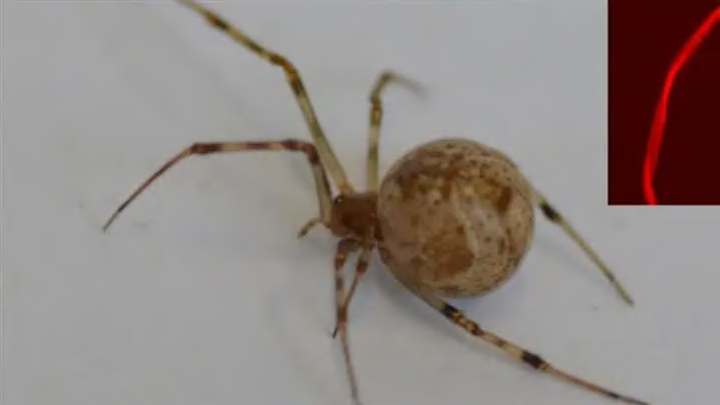CRISPR-Cas9, a technology used to edit the DNA of living organisms, has been exciting scientists for years. They hope to eventually use the tool to cure certain genetic medical conditions, such as cancer, hepatitis B, and high cholesterol. The tool can also be used for less consequential—though still impressive—purposes. Researchers have tested gene-editing on spiders for the first time, producing results straight out of a comic book.
Using CRISPR-Cas9, the University of Bayreuth’s Biomaterials research group was able to bioengineer a common house spider to produce glowing red silk. Professor Thomas Scheibel and doctoral student Edgardo Santiago-Rivera achieved this by combining CRISPR with a gene sequence for a red fluorescent protein. The researchers injected the mixture into unfertilized spider eggs and allowed the female spiders to mate with male house spiders. Their offspring produced red fluorescent silk, showing that CRISPR-Cas9 can be used to alter silk proteins without affecting production.
The results are good news for materials science research. According to Scheibel, similar gene-editing techniques could one day be used to make strong spider silk even stronger. The study appears in the journal Angewandte Chemie International Edition.
Spider silk is known for being biodegradable, light, and durable. The Darwin‘s bark spider weaves the largest webs in the world, and its silk is the strongest biological material known to science. A strand of this arachnid’s silk is about 10 times stronger than a piece of Kevlar (a tough fiber used in protective military equipment and bulletproof vests) of the same size. If gene-edited spider silk becomes widely produced, some potential uses might include biodegradable bottles, surgical thread, artificial tendons, and water-resistant clothing.
In addition to editing animal genes, CRISPR can also be used to manipulate plants. Scientists have used the gene-editing system to make grape vines more resistant to pathogens and produce better tasting, high-quality wine.
Read More About Spiders:
